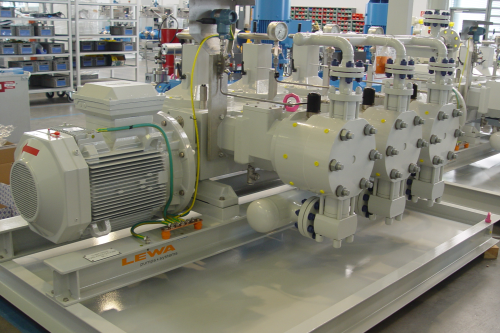
To convert sour crude oil into valuable and refined fuel the impurities need to be removed. However, sour crude oil is toxic, hazardous and extremely corrosive which makes its transportation to the preparation system challenging.
Critical applications of conveying mixtures of acidic hydrocarbon/water to the washing system have always been a challenge for any pump manufacturer. This was also the case in one recent project Lewa handled in the Emirate of Abu Dhabi.
On the project Lewa was asked to provide a solution to pump liquid hydrocarbons from the flare knock-out drum or the blow-down drum respectively and convey the acidic hydrocarbon/water mixture back into the oil line to the washing system. Since the differences in these processes are only minor, it was possible to supply 16 mechanically identical pumps of the Lewa Ecoflow series, driven by 55 kW electric motors, measuring 2.7 × 1.9 m, 1.9 m high, and weighing 4200 kg.
Strict selection criteria
To ensure high reliability in operating the system, despite the project's difficult conditions, the customer defined a series of strict selection criteria. The critical fluid characteristics that had been taken into consideration while designing the pumps are: high content of sulphur of about five percent, high chlorine content, high temperatures and highly humid conditions under which even stainless steel corrodes. Since the medium conveyed is very volatile and extremely hazardous, Lewa selected hermetically tight diaphragm pump heads made of superduplex stainless steel. The diaphragm itself, due to the eroding effect of the particles in the corrosive liquid, is made of wear-resistant PTFE. Special suction valves ensure a low NPSHr value.
While designing the pumps, it was also necessary to take into consideration that the mixing ratio of water to hydrocarbons in the liquid phase varies significantly and that the pressure can vary between 20 and 45 bar. “So we designed the pumps to handle a flow rate between 0.5 and about 15 m3/h of the acidic mixture,” says Sriram Iyer, who works for Lewa in Dubai. To ensure that the pumps work reliably despite the changing flow rate, the net positive suction head of the system (NPSHa) also had to be kept higher than that required at the pump suction (NPSHr). When pure hydrocarbons are conveyed on hot summer days, their vapour pressure rises and the risk of cavitation increases. Various options were analysed with the customer to tackle this issue. Lewa offered integrated special suction valves to keep the suction pressure requirements low and satisfy all process conditions.
According to the customer, since commissioning, the installed Lewa pumps have been running smoothly and with high reliability – fulfilling the expectation of the maintenance and operating personnel. The on-call time agreement that permits uninterrupted work at the plant even when one of the pumps needs maintenance is also working seamlessly.





